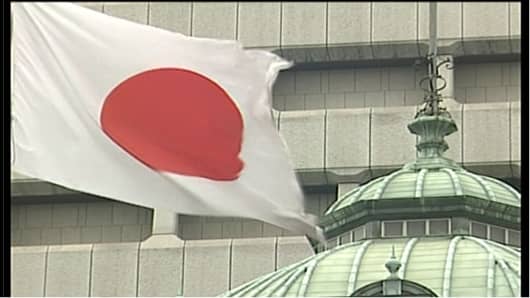Japan's government may be forced by opposition lawmakers to change its candidate to head the central bank, with former Deputy Governor Yutaka Yamaguchi a possible alternative, local media reported on Sunday.
The government's favoured candidate, current Bank of Japan Deputy Governor Toshiro Muto, was still the frontrunner to replace Governor Toshihiko Fukui when he retires in just over
two weeks, the Yomiuri newspaper said, but a parliamentary row on Friday has threatened his candidacy.
Muto is the firm favourite of financial markets, polls have shown, and a sudden change in course to another candidate would surprise them, although Yamaguchi was a Bank of Japan official for many years.
"Monetary authorities and business lobbies are recommending Muto. It's natural for him to become governor," Bunmei Ibuki, the secretary general of ruling Liberal Democratic Party, was
quoted as saying by the Asahi newspaper.
Muto had been seen as a clear frontrunner until Friday when the opposition, already uneasy with the idea of a former senior finance ministry official such as Muto running the central
bank, was angered when the government passed its annual budget through parliament's lower house despite a plea for more debate.
The opposition Democrats declared that cooperation with the government had ended, and Japanese media reported that the main opposition party would reject Muto's appointment as BOJ governor.
Opposition control of parliament's upper house gives the Democrats and their allies the power to veto key appointments such as central bank governor.
Yamaguchi, a career central banker who served as deputy BOJ governor from 1998 until he retired in 2003, is known for his extensive knowledge on economic theories.
But central bank watchers also say the 67-year-old may lack Muto's skills in political maneuvering.
e was criticised, along with then BOJ chief Masaru Hayami, for raising Japanese interest rates from zero in August 2000 -- a move the government blamed for an subsequent economic slump.
Japanese interest rates have been low for years, as it struggled to recover from a burst bubble in 1990, and currently sit at just 0.5 percent.
The central bank wants to raise rates to return them to more normal levels and avoid economic overheating, but it has been stymied by market turmoil in the wake of the U.S. subprime
crisis.
Japanese media reported on Sunday that the government had been angered that the opposition had allowed politics to intrude into monetary policy, but they also reported that other candidates could not be ruled out.
The government has said it is unwilling to risk a policy vacuum at the central bank as the world faces a slowdown and a possible U.S. recession.
The government is seen putting forward candidates for governor and two deputies sometime this week, to allow 10 days for parliament's two houses to consider the appointments.
Many Democrat lawmakers have said Muto is unsuitable to lead the central bank because as a former vice finance minister he is too close to the government. They argue for a complete
separation of monetary and fiscal policy.
While angered by the budget move on Friday, the Democrats may soften their stance after a cooling-off period, the Yomiuri newspaper said.
But it also reported that a senior Democratic lawmaker said the party would endorse Yamaguchi should he be nominated as governor.


